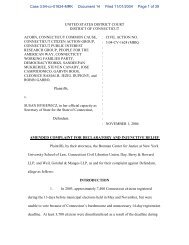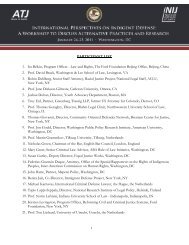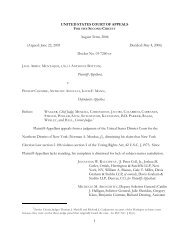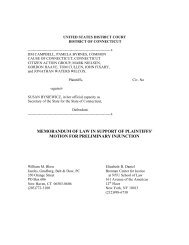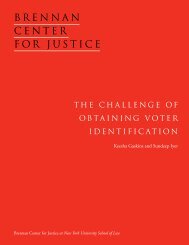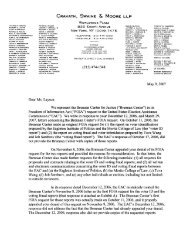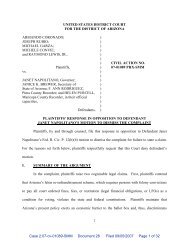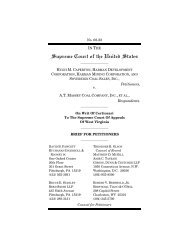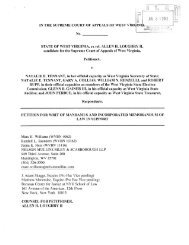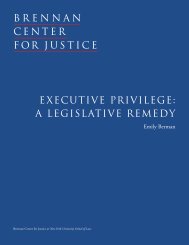THE NEW YORK STATE LEGISLATIVE PROCESS: AN ...
THE NEW YORK STATE LEGISLATIVE PROCESS: AN ...
THE NEW YORK STATE LEGISLATIVE PROCESS: AN ...
Create successful ePaper yourself
Turn your PDF publications into a flip-book with our unique Google optimized e-Paper software.
at 244, 547-48.<br />
148 Aubrey Jewett, Evaluating Changes in Florida’s Legislative Process: Innovative Rules and Conservative<br />
Norms, 30 POL. & POL’Y 40, 46 (2002).<br />
149 Most state legislative chambers require bills to be read three times. A “reading” does not<br />
necessarily require that the entire text of the bill be read aloud in the chamber each time it is considered<br />
– very few states require this, and New York is not one of them. Generally, first reading<br />
occurs at bill introduction; second reading occurs when bills are reported out of committee and<br />
onto the floor for consideration and amendment; and third reading is the time when a vote is taken<br />
on final passage. New York is typical of most states in this regard. In most states, however, readings<br />
must generally occur on separate days, usually with two or three days between readings. While<br />
the New York Assembly follows this pattern, the New York Senate is one of only seven upper chambers<br />
that permit all three readings to occur on the same day. See NEAL, supra note 35, at 90.<br />
150 N.Y. SEN. R. V, § 6(c).<br />
151 N.Y. SEN. R. VIII, § 2(b).<br />
152 NCSL, INSIDE <strong>THE</strong> <strong>LEGISLATIVE</strong> <strong>PROCESS</strong>, supra note 33, at 5-40.<br />
153 N.Y. SEN. R. VIII, § 7.<br />
154 Id.<br />
155 JOSEPH F. ZIMMERM<strong>AN</strong>, <strong>THE</strong> GOVERNMENT <strong>AN</strong>D POLITICS OF <strong>NEW</strong> <strong>YORK</strong> <strong>STATE</strong> 141<br />
(1981).<br />
156 Pitney, supra note 89, at 495. “[O]rdinarily, a member delays passage of his measure either<br />
to wait for agreement or compromise, or because a companion bill is on the way from the other<br />
house and he wants to move its substitution.” RIENOW, supra note 97, at 126.<br />
157 Pitney, supra note 89, at 494 (quoting Senator Leichter).<br />
158 See ZIMMERM<strong>AN</strong>, supra note 155, at 141.<br />
159 See N.Y. ASSEMB. R. III, § 7.<br />
160 The bill’s sponsor alone may remove the bill from the calendar. N.Y. ASSEMB. R. III, §<br />
7(e).<br />
161 RULES <strong>AN</strong>ALYSIS, supra note 15.<br />
162 See NCSL, INSIDE <strong>THE</strong> <strong>LEGISLATIVE</strong> <strong>PROCESS</strong>, supra note 33, at 5-48 tbl.98-5.14. See also<br />
ROSENTHAL, supra note 80, at 146.<br />
163 See NCSL, INSIDE <strong>THE</strong> <strong>LEGISLATIVE</strong> <strong>PROCESS</strong>, supra note 33, at 5-49 to 5-50 tbl.98-5.15.<br />
In the U.S. Senate, the Majority Leader “may bring reported bills up immediately; may leave them<br />
on the calendar for longer periods of time; and may … leave some there till they die at the end of<br />
the session.” TIEFER, supra note 33, at 559. In the U.S. House of Representatives, bills are placed<br />
automatically on the calendar, Id. at 244, 252.<br />
164 Id. at 244, 252, 584.<br />
165 See supra note 166. NEAL, supra note 35, at 92. Tommy Neal reported in 1996 that 14 chambers<br />
did not limit debate.<br />
166 RULES <strong>AN</strong>ALYSIS, supra note 15. The rules of debate are as follows [hereinafter RULES<br />
<strong>AN</strong>ALYSIS DEBATE RULES]: ALA. H.R.52;ALA. SEN. R. 20 & 39(a); ALASKA UNIFORM R. 26; ARIZ.<br />
H. R. 18(E)-18(G); ARK. H. R. 83 & 84; ARK.SEN. R. 9.04 & 9.08; CAL.ASSEMB. R. 108; CAL.SEN.<br />
R. 35(b); COLO. H. R. 13(d) & 14(a); COLO. SEN. R. 9(c); CONN. H.R.17;CONN. SEN. R. 14; FLA.<br />
H. R. 8.7 & 11.9; FLA. SEN. R. 8.5 & 8.6; GA. H. R. 78, 79, & 80; GA. SEN. R. 50(b)-(c); HAW. H.<br />
R. 50.1; HAW.SEN. R. 70; IDAHO H. R. 22; ILL. H. R. 52; ILL.SEN. 7-3(g); IND. H. R. 42; IND.SEN.<br />
ENDNOTES 69



